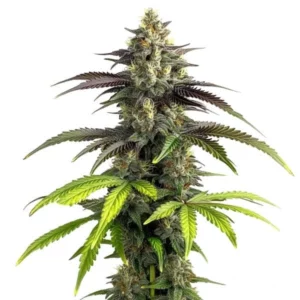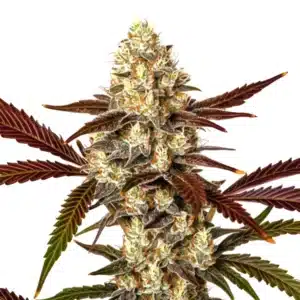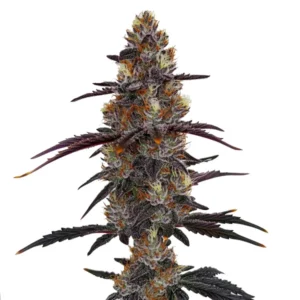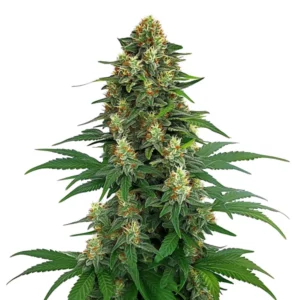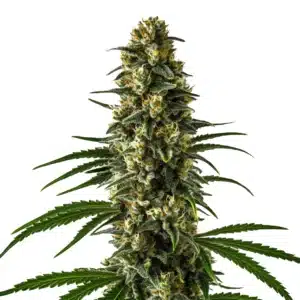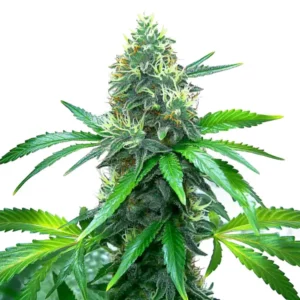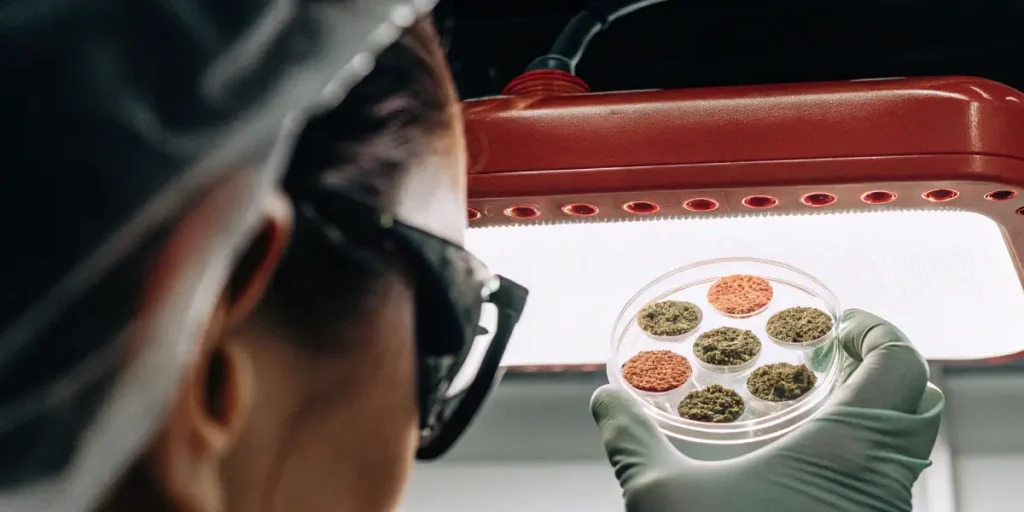
Full Spectrum Cannabinoid Conversion with Enzymes
The cannabis industry is buzzing with the potential of full spectrum cannabinoid conversion with enzymes. This innovative approach offers a new way to enhance the natural profiles of cannabis plants. Imagine creating a rich tapestry of cannabinoids, all from a single source. This isn’t just science fiction; it’s a reality with enzyme technology for cannabinoid conversion.
By tapping into the enzyme-assisted cannabinoid conversion process, growers and manufacturers can maximize the potential of each plant. This technique allows for the transformation of cannabinoids in a natural and efficient manner. Enzymes act as tiny helpers, facilitating complex biochemical reactions that would otherwise take much longer.
Recommended Strains
Bruce Banner #3
|
|
THC | 20% - 29% (High) |
|
|
Type | Feminized |
|
|
Yield | Medium |
|
|
Phenotype | 50% Indica / 50% Sativa |
Bruce Banner 2.0
|
|
THC | 25% - 30% (High) |
|
|
Type | Feminized |
|
|
Yield | Medium |
|
|
Phenotype | 35% Indica / 65% Sativa |
For those exploring the possibilities of cannabis cultivation, strains like Bruce Banner 3 from Blimburn Seeds serve as a perfect starting point. Known for its potent effects and rich cannabinoid profile, Bruce Banner 3 showcases what’s possible when optimizing cannabinoid conversion with enzymes. This strain can highlight the benefits of a full spectrum cannabinoid enzymatic transformation.
How Enzymes Transform Cannabinoids
Enzymes are nature’s catalysts. They speed up chemical reactions without being consumed in the process. In the world of cannabis, they play a pivotal role in converting cannabinoids from one form to another. This transformation can significantly enhance the overall cannabinoid profile of the plant.
For instance, enzymes can convert CBGA, the mother of all cannabinoids, into other cannabinoids like THC and CBD. This conversion process is crucial for producing the diverse range of effects that different cannabis strains offer. Enzymes help streamline this process, making it more efficient and reliable.
Full spectrum cannabinoid conversion with enzymes not only enhances the natural properties of the plant but also allows growers to tailor the cannabinoid profiles to meet specific needs. By using enzyme technology for cannabinoid conversion, cultivators can create bespoke strain profiles that cater to both recreational and medicinal users.
The enzyme-assisted cannabinoid conversion process ensures that the plant’s full potential is realized. This is especially important for preserving the integrity of the strain’s unique qualities while enhancing its effects. The ability to conduct full spectrum cannabinoid enzymatic transformation opens up new possibilities in cannabis cultivation and product development.
Promos & Deals
Benefits of Using Enzymes in Cannabinoid Conversion
The use of enzymes in cannabinoid conversion offers several advantages. First and foremost, it’s a natural process. Enzymes are already present in the human body and various plants, making them a safe and sustainable option for cannabis conversion.
Moreover, enzymes can increase the efficiency of cannabinoid conversion. This means more consistent results and a higher quality product. Growers can achieve a full spectrum cannabinoid profile more easily, enhancing the overall experience for consumers.
Another significant benefit is the reduction in time and resources required for cannabinoid conversion. Enzymes expedite the conversion process, making it more manageable and cost-effective. This allows producers to focus on enhancing full spectrum cannabinoid profiles with enzymes, potentially leading to new product lines and market opportunities.
Enzymes also contribute to a cleaner and more eco-friendly cultivation process. By reducing the need for synthetic chemicals, enzymes support sustainable agricultural practices. This not only benefits the environment but also aligns with the growing consumer demand for naturally produced cannabis products.
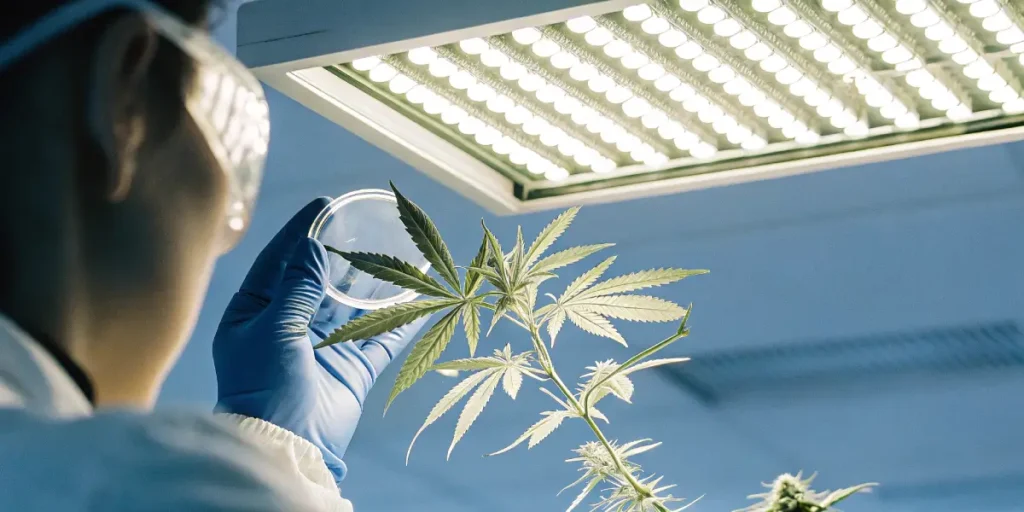
Practical Applications of Enzymes in Cannabis Cultivation
Incorporating enzymes into cannabis cultivation isn’t just about improving cannabinoid profiles. It’s also about enhancing the growth process. Enzymes can help plants absorb nutrients more efficiently, leading to healthier and more robust growth.
For example, enzymes can break down organic matter in the soil, making nutrients more accessible to the plant’s roots. This can result in stronger plants with better yields. Additionally, enzyme technology for cannabinoid conversion can reduce the need for synthetic fertilizers, making the cultivation process more eco-friendly.
Enzyme-assisted cannabinoid conversion process extends beyond just cannabinoid enhancement. It also plays a role in promoting overall plant health. By ensuring optimal nutrient uptake, enzymes help cannabis plants reach their full potential, resulting in a more vibrant and productive crop.
Furthermore, optimizing cannabinoid conversion with enzymes can lead to the development of specialized cultivation techniques tailored to enhance specific strain characteristics. This precision in cultivation can result in unique and highly sought-after cannabis products, further elevating a grower’s offerings in a competitive market.
Challenges and Considerations
While the benefits of using enzymes in cannabinoid conversion are clear, there are some challenges to consider. Enzymes are sensitive to environmental conditions. Temperature, pH, and other factors can influence their effectiveness. Therefore, maintaining optimal conditions is crucial for success.
Another consideration is the cost. High-quality enzymes can be expensive, and integrating them into the cultivation process requires an initial investment. However, the potential return in terms of enhanced product quality can outweigh these costs.
It is essential for growers to understand the specific requirements of enzyme technology for cannabinoid conversion. This includes proper storage and handling to maintain enzyme activity and effectiveness. Without careful management, the potential benefits could be diminished.
Additionally, growers must be prepared to adapt their cultivation practices to incorporate enzymes effectively. This may involve changes in facility design, cultivation schedules, and even staff training. However, those willing to embrace these changes can find themselves at the forefront of cannabis innovation, leveraging full spectrum cannabinoid conversion with enzymes to their advantage.

FAQs
What is full spectrum cannabinoid conversion with enzymes?
This process involves using enzymes to convert cannabinoids into a full spectrum profile. Enzymes help transform cannabinoids like CBGA into various forms, enhancing the plant’s natural effects. This method is efficient and can be tailored to produce specific cannabinoid profiles.
For example, a strain like Tangie can benefit from this process. Enzymes can amplify its natural citrusy qualities, offering a more robust sensory experience. This makes the strain more appealing to consumers looking for unique and potent effects.
Full spectrum cannabinoid enzymatic transformation offers growers the ability to maximize the plant’s natural potential. By customizing the cannabinoid profile, producers can address specific consumer needs, whether for therapeutic purposes or recreational enjoyment.
The enzyme-assisted cannabinoid conversion process also enhances the plant’s ability to express its unique characteristics. This leads to a finished product that is not only potent but also rich in flavor and aroma, providing an unparalleled experience for the end user.
How do enzymes affect the cannabinoid profiles of cannabis strains?
Enzymes facilitate the conversion of cannabinoids, allowing for a more diverse and rich profile. This enhances the plant’s natural properties and can lead to more potent effects. By optimizing the conversion process, enzymes ensure that the final product is both high-quality and consistent.
Consider a strain like Bruce Banner 3. With enzyme technology, its already potent effects can be further enhanced. This makes it a great choice for those looking to experience the full potential of their cannabis plants.
Enhancing full spectrum cannabinoid profiles with enzymes provides a pathway to unlocking the full range of benefits that cannabis has to offer. By fine-tuning the conversion process, growers can create products that deliver targeted effects, appealing to a wide range of consumer preferences.
The consistent application of enzyme technology for cannabinoid conversion also ensures that each harvest meets high-quality standards. This reliability is crucial for building consumer trust and establishing a strong market presence.
Are there any strains that particularly benefit from enzyme-assisted conversion?
Yes, many strains can benefit from this process. Strains like Girl Scout Cookies, Tangie, and Bruce Banner 3 are excellent examples. These strains have unique cannabinoid profiles that can be amplified through enzyme-assisted conversion.
Using enzymes, these strains can achieve a more balanced and potent effect. This makes them appealing to both recreational users and those seeking specific medicinal benefits.
Optimizing cannabinoid conversion with enzymes can lead to groundbreaking results for these strains, enhancing their natural attributes and increasing their appeal in the marketplace. This transformative process allows growers to offer products that stand out due to their enhanced potency and flavor profiles.
Additionally, the enzyme-assisted cannabinoid conversion process can be tailored to enhance specific compounds within these strains, such as terpenes, further broadening their appeal and providing a more comprehensive cannabis experience for consumers.
What are the environmental considerations when using enzymes in cannabis cultivation?
Enzymes offer an eco-friendly alternative to synthetic additives. They help plants absorb nutrients more efficiently, reducing the need for chemical fertilizers. This can lead to a more sustainable cultivation process overall.
Strains like Tangie can thrive in environments optimized with enzymes. This not only enhances their natural qualities but also supports a healthier growing environment.
By implementing enzyme technology for cannabinoid conversion, growers can significantly lower their environmental footprint. The reduced reliance on chemical inputs aligns with broader sustainability goals and meets the increasing consumer demand for eco-conscious products.
The full spectrum cannabinoid conversion with enzymes also contributes to soil health improvement, as enzymes promote the breakdown of organic matter and nutrient recycling. This fosters a more resilient and productive growing environment, ultimately benefiting both the plants and the ecosystem.
Is enzyme technology for cannabinoid conversion cost-effective?
While there is an initial investment required, the long-term benefits often outweigh the costs. Enzymes can lead to higher quality and more consistent products, which can justify the investment. Additionally, the reduced need for synthetic inputs can result in cost savings over time.
Growers using strains like Girl Scout Cookies can see significant improvements in both yield and quality. This makes enzyme technology a valuable tool for those looking to optimize their cannabis cultivation.
Full spectrum cannabinoid enzymatic transformation offers a cost-effective solution by improving yield and quality, resulting in products that command a premium in the market. This return on investment can significantly offset the initial costs associated with enzyme implementation.
Moreover, the scalability of enzyme-assisted cannabinoid conversion process ensures that as production increases, the relative cost per unit decreases, making it a financially viable option for large-scale operations aiming to maintain high product standards.



